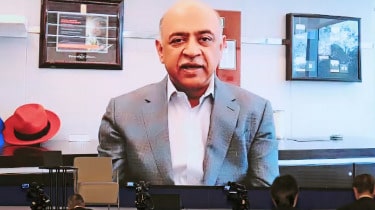
TOKYO — Artificial intelligence and hybrid cloud technology, as well as quantum computing, will be forces that shape the near future of the IT industry, IBM CEO Arvind Krishna told the Nikkei Global Management Forum in Tokyo on Wednesday.
While pointing out that some analysts estimate AI could add up to $16 trillion to global productivity over the next decade or so, Krishna said: “We are only 4% of the journey there,” adding, “Our assertion is that every company will become an AI company.”
The annual forum brings together influential corporate leaders from around the world to share their views on the role of business in society. This year’s theme centers on responding to an unprecedented time of change brought on by the COVID-19 pandemic.
Krishna, who took the helm at IBM in April, stressed the importance of the hybrid cloud, saying that “the hybrid approach has a lot more value for our clients,” and noting that the technology will “unlock two and a half times more value than a singular public cloud.”
Hybrid cloud technology enables data to be shared between two or more clouds, giving businesses access to public and private clouds at the same time and allowing more flexibility.
Krishna also stressed the importance of quantum computing, which he said “can unlock many benefits for both industry and society that are beyond the reach of today’s computers.”
“We believe within three to five years you can begin to tackle problems that are beyond the reach of normal computers,” he said, citing potential applications. “You can solve problems around molecules like lithium hydride, which is an element in many electric batteries.”
However, Krishna also pointed out that it is necessary to improve accuracy in quantum computing in order to tap its full potential, saying, “Today, these computers have a lot of errors. … It is an issue that has to be solved.”
Rakuten CEO takes on Japan’s entrenched telecom incumbents
Online retailer Rakuten’s membership base and credit card business model provided the impetus for launching the company’s new wireless service, Rakuten Mobile, chairman and CEO Hiroshi Mikitani told the forum.
“Creating an entry point for inviting customers was the initial concern,” Mikitani said of Rakuten’s ambitious new telecoms carrier, Japan’s fourth. Since September, Rakuten Mobile has generated headlines with a subscription rate of 2,980 yen ($28) a month, about half the fee charged by competitors NTT Docomo, KDDI and SoftBank Mobile.
“We already had a track record in acquiring customers, and we have a membership of 100 million,” Mikitani said of the e-commerce business. “In credit cards, we have Rakuten Card and now it is the No. 1 card in Japan. What I wanted to do was eliminate all the paperwork and reduce the cost,” he said, a model he has applied to the telecoms business.
Rakuten’s sales point for mobile subscribers is its integration with the company’s e-commerce ecosystem. The 2,980 yen monthly service fee translates to points that can be redeemed for purchases on Rakuten’s marketplace. “So basically your phone will be free of charge,” Mikitani suggested.
The young telecom carrier was also helped by fortunate timing, as its launch coincided with the election of Prime Minister Yoshihide Suga. A former telecommunications minister, Suga has long been a critic of the high rates charged by Japan’s three incumbent wireless carriers. “Prime Minister Suga will herald a new change,” Mikitani said.
“Current cellphone businesses have about 600 interconnected mainframe machines, but I brought in a breakthrough so that everything is on the cloud, even the base stations,” Mikitani said. “Our operating costs are lower because the core technology is 100% virtualized.”
The 55-year-old executive, who appeared youthful on stage in a black T-shirt and sport coat, still considers himself an entrepreneur despite Rakuten’s strong growth over the past quarter century.
“My friends, including the president of a large cellphone company in the U.S., said, ‘Miki, good luck,'” he recalled. “They didn’t think that I would be successful. As an entrepreneur, when I’m challenged by such people, I get even more motivated to make [my business] successful,” Mikitani said.
SCB Abacus uses AI to serve underbanked customers amid pandemic
SCB Abacus, the fintech arm of Thailand’s Siam Commercial Bank, is finding new customers despite the COVID-19 pandemic.
“We are faced with challenges from weak demand and deteriorating financial health. Most incumbent players are focusing on less risky customers,” said CEO Sutapa Amornvivat.
“We feel that small businesses’ key problem is access to cash, and a lot of this can be solved by using alternative data that traditional banks don’t look at to underwrite and help them through this crisis,” Sutapa said.
Using artificial intelligence created by Amazon Web Services, Abacus launched three years ago as Thailand’s first digital lending platform.
“The fundamentals of lending are still the same, but we provide a customer experience that fits their backgrounds,” Sutapa said. Most of the underbanked are sole proprietors who operate with cash and work beyond regular banking hours. Digital banking is convenient for such customers, especially as COVID restricts public transportation and mobility.
‘Working with SCB has a synergy because Abacus has innovation and SCB has distribution,” she said.
Aside from commercial banking, Abacus is exploring credit rating and fraud detection services not only for the financial sector but also for equipment rental and leasing companies.
While AI has helped Abacus serve the unbanked in Thailand, Sutapa acknowledged the potential inequality it can create. “Mobile penetration does not translate into digital literacy,” she said, adding that investing in digital literacy is key. “I strongly believe that’s a public good, and that’s where the government comes in.”
The three-year-old company is taking a step-by-step approach to expansion, first in Thailand, then in Asia, before moving on to the rest of the world. “We are looking for strategic investors with networks and technology to help us expand into the region,” Sutapa said.
“Data and technology we can purchase, but trust needs time to build. It needs to be earned, not just with customers but also with regulators,” she said.
Trip.com CEO sees pent-up demand for Japan tourism
Trip.com’s vast network of contacts helped it set up programs to help its clients weather the travel industry slowdown caused by COVID-19, particularly the small clients that make up the bulk of its business, said CEO Jane Jie Sun.
The Shanghai-based company’s coronavirus strategy included a 2 billion yuan ($303 million) disaster relief fund to help clients worldwide and small loans to help smaller players stay afloat. It was also able to buy perishable inventory held by certain clients and find buyers at a discount. For example, rooms at Hyatt hotels normally cost $300 to $400 per night, but Trip.com was able to offer them to customers for future stays at $100 per night.
“Customers were able to get a good deal,” Sun said. “In return, they have to prepay for that service, so our partners can get cash flow.”
Domestic travel in China has recovered to 80% of its pre-COVID level, Sun said. As international travel remains difficult, Trip.com has shifted its focus to promoting domestic travel in the countries where it operates.
Livestream promotions for domestic travel in July, for example, reaped $3.9 million in gross merchandise volume in Japan, with 23,000 hotel room nights booked.
“There’s a lot of pent-up demand for tourism in Japan,” said Sun. “Japan is very favored by Chinese tourists because of the hospitality of Japanese people, and there’s a lot of variety — mountains, ski resorts, warm springs. Thirdly, it’s very close by,” Sun said.
“Some of our high-end customers visit Japan up to 12 times a year,” she said.
Japan’s tourism industry is heavily dependent on Chinese visitors, welcoming 6.9 million arrivals last year. Sun said she travels to Japan every year and hopes to ski in Niseko this year and attend the Tokyo Olympics next summer.
Sun credited Trip.com’s young workforce for the company’s growth. The average age of Trip.com’s 41,000 employees is 26. A program called Baby Tiger encourages employee innovation and promotes engineers to top business positions.
Additionally, Sun has made the advancement of female employees a priority. Sun is one of the few women CEOs among China’s major tech companies.
Although Trip.com pays a small bonus of 800 yuan ($120) to new mothers, an additional 3,000 yuan is paid when the child begins school. Taxi rides are also subsidized for pregnant employees, and the company financially supports women employees who have their eggs frozen to encourage them to pursue advanced degrees, Sun said.
AI has role in future of public health: Microsoft President Smith
As the novel coronavirus continues to disrupt lives around the world, the future of public health is “really about using AI,” said Brad Smith President of Microsoft, speaking to the forum earlier.
“We cannot leave COVID-19 behind,” Smith said, adding, “We could face another pandemic in our future,” in remarks delivered via video link to the Nikkei Global Management Forum. Smith said that AI can help with “managing hospital resources, to understand where resources are, where there are shortages, where things can be moved.”
As concern grows over how technology companies use people’s personal data, Smith said Microsoft is committed to transparency and works to ensure that its rules safeguard data to build consumers’ trust in the tech company.
Sustainability is another hot topic for Microsoft. Smith vowed to “create digital technology services to empower the world and to better measure, monitor and ultimately reduce the carbon emissions.”
He acknowledged that his company “consume[s] energy to power the world’s computers,” and said, “we need to do our part to become more efficient, and use renewable energy and remove carbon from the environment.”
Nitori CEO says furniture retailer speeding up overseas expansion
In an effort to accelerate its global expansion, Akio Nitori, chairman and CEO of Japanese furniture retailer Nitori Holdings, told the forum that “from next year, [we] want to open 10 to 20 [new stores] every year” overseas.
The company currently has stores in Taiwan, the U.S. and China. Nitori said he has high hopes for the Chinese market, particularly, where incomes are still rising, adding that “winning in the Chinese market means successes in the world.”
In Japan, despite Nitori stores in shopping malls having to close due to the coronavirus pandemic, the company has seen sales jump as many people turn their homes into offices and classrooms.
He said that COVID-19 has “changed consumers’ shopping behavior,” and that many of them are spending less time in physical stores. But at the same time, the number of app users is increasing, he said.
Nitori said he “sees that the prospect of reaching [sales of] 100 billion yen ($951 million)” soon comes from app users. At present, those customers account for around 70 billion yen of sales, adding that app users spend more than twice as much as other customers.
The coronavirus outbreak has led to lockdowns in many countries, causing logistics disruptions worldwide. Nitori said his company had difficulty obtaining materials from China to make sofas due to the disruption. He said his company is now “rebuilding the supply chain” and pledged “not to rely on one country.”
Central Retail CEO optimistic about recovery of Thai economy
Yol Phokasub presented not only a positive outlook for Central Retail’s business, but also made a pitch for global companies to relocate to Thailand.
“Look at the country of Thailand. People know it as a place for tourism. At the moment, it is one of the few countries in the world that is safe to live and work [in],” said the CEO of Central Group’s retail arm. “I would invite CEOs to come and work from Thailand, so you have better peace of mind.”
Yol said that the news of a vaccine created by Pfizer that has shown 90% efficacy in preventing the coronavirus was welcome, but that he was not pegging Central Retail’s fortunes on the development.
“I don’t think we can rely on whatever the outcome is,” Yol said. “It doesn’t mean that everything will reset and go back to normal. We have to adapt to a new life.”
Central Retail recorded a loss of 2.6 billion baht ($86 million) in the second quarter ended in June, with fashion and food sales suffering the biggest hit.
Asked whether customer behavior has changed during the pandemic, Yol, a computer scientist by training, had a different take. “Before the pandemic, we talked about technological disruption. When you look into the details, it’s not a technology disruption, it’s a customer disruption. Customers changed, and technology helped them assert the change.”
Yol foresees an uneven post-pandemic recovery for businesses and industries. Central Group was in a fortuitous position as Thailand went into lockdown in April. Two months earlier, it had the biggest initial public offering in Thai history, worth $2.5 billion.
Yol said the capital from the IPO would be used for expansion and partnerships in the three countries where Central Retail operates: Thailand, Vietnam and Italy.
Philip Morris Japan President Goh: inclusive corporate culture drives transformation
Diversity and inclusion are helping Philip Morris to transform itself from a traditional tobacco company into one focused on smoke-free alternatives, said Shea Lih Goh, president of its Japanese affiliate.
The company announced its commitment in 2016 to gradually withdraw from the business of making and selling cigarettes, Goh told forum attendees.
“It’s a major transformation requiring changes across the whole company,” Goh said, “having a very diverse workforce and creating an inclusive workplace for everyone, so that we can all get different ideas, a lot of perspectives and have the innovation and drive to reach our ambitious goal.”
Goh said one of the focuses at Philip Morris Japan is to close the gender salary gap, which is a foundational step in creating a gender-balanced organization.
In 2016, the company was awarded the Equal-Salary Certification as the first company outside Switzerland to be recognized by the Swiss nonprofit organization Foundation Equal-Salary. It has achieved certification annually for the past four years.
“We proudly closed the salary gap to only 0.4% in 2018. And that’s remarkable … if you compare [that] to the average in Japan, which is around 24%,” Goh said.
She borrowed the words of U.S. Vice President-elect Kamala Harris saying, “I’m the first female president of Philip Morris Japan and I certainly know and hope I won’t be the last.”
Financial services need to accelerate investment in digital: FactSet CEO
Despite the pandemic hitting the bottom lines of businesses around the world, more companies are increasing their investment in digital technology, Philip Snow, CEO of financial information provider FactSet, told the forum.
Snow stressed that the coronavirus pandemic “is causing a lot of companies to invest more quickly” in cutting-edge technologies.
He noted that the financial industry has lagged behind when it comes to applying cutting-edge technology to their business, saying, “There’s a lot of pressure within financial services on the cost side.” But the industry “need[s] to invest in digital transformation themselves to be more efficient, whether it’s [in] Japan or in any other country.”
Regarding FactSet’s strategy for growth in Asia, Snow said what he is “excited about is the wealth markets” in the region, adding, “There’s a huge amount of wealth that’s been built in Asia.”
With regard to nurturing talent and creating a better working culture, Snow said, “Creating that culture of innovation is creating an environment where people feel comfortable submitting their ideas.”
To foster those new ideas, FactSet holds hackathons in conjunction with clients, in which software developers compete to develop new products and services.
Article: Hybrid cloud and quantum computing to shape IT: IBM chief










